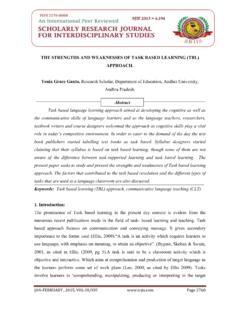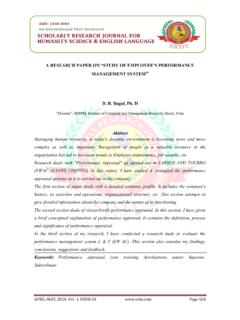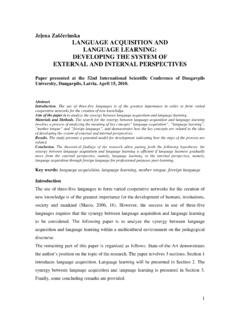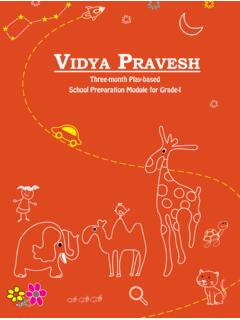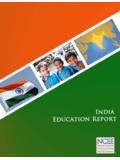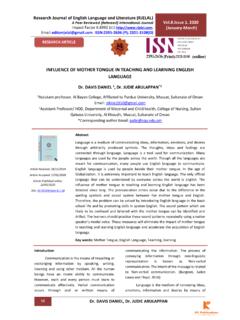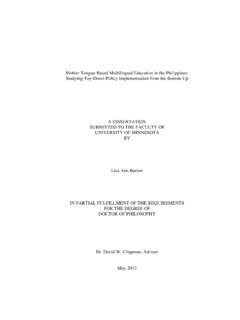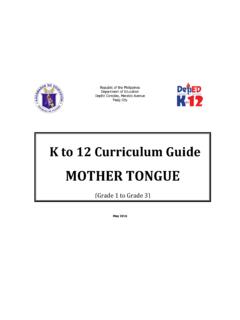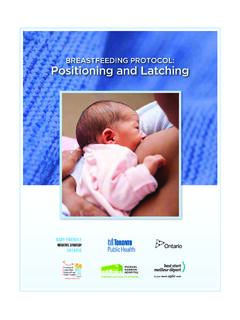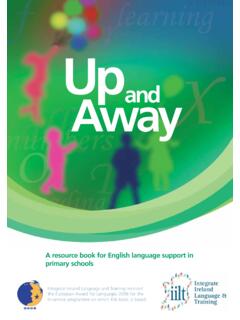Transcription of 14.hum-EFFECTS MOTHER TOUNG LANGUAGE ON …
1 Impact Factor(JCC): This article can be downloaded from IMPACT: International Journal of Research in Humanities, Arts and Literature (IMPACT: IJRHAL) ISSN(E): 2321-8878; ISSN(P): 2347-4564 Vol. 3, Issue 7, Jul 2015, 81-88 Impact Journals EFFECTS MOTHER tongue LANGUAGE ON LEARNING SECOND LANGUAGE LEARNERS ELEMENTARY SCHOOL SAHELEHKHEIRABADI Research Scholar, IASE, Pune, Maharashtra, India ABSTRACT There is considerable evidence that the acquisition of two or more languages involves positive consequences for meta-linguistic development and the people who had acquired literacy in two languages did significantly better in the acquisition of a third LANGUAGE than performed people from monolingual backgrounds or those who had not acquired literacy in their home LANGUAGE .
2 A research displayed that the bilinguals scored higher than monolinguals on verbal and non-verbal intelligence tests and indicated a more diversified intelligence structure (Cummins, 1992). One of the important assumptions considering the efficiency of bilingual instruction is that skills and knowledge learned in first LANGUAGE MOTHER tongue transfer to second LANGUAGE L2. When people go on to expand their abilities in two or more languages throughout their primary school years, they catch a deeper understanding of LANGUAGE and how to use it effectively.
3 They possess more practice in processing LANGUAGE , especially when they gain literacy in both, and they are able to compare and contrast the ways in which their two languages organize reality. This paper offers that bilingual children may also develop more flexibility in their thinking as an outcome of processing information through two different languages. KEYWORDS: Bilingualism, MOTHER tongue , Second LANGUAGE , Learning, Direct Method, GTM Method INTRODUCTION In the process of teaching a foreign LANGUAGE , the teacher s use of MOTHER tongue can influence the learner s acquisition of the target LANGUAGE .
4 Throughout the history of English LANGUAGE teaching and second LANGUAGE acquisition, the role of MOTHER tongue has been an important issue. The various views are reflections on the methodology changes in English LANGUAGE teaching, which have in such way brought different perspectives on the role of MOTHER tongue . In this thesis I will discuss the role of MOTHER tongue in teaching English as a foreign LANGUAGE . I would like to find out to what increase and what decrease the role of MOTHER tongue in the process of teaching a foreign LANGUAGE .
5 Although the use of MOTHER tongue was banned by the supporters of the direct method at the end of the nineteenth century, the positive role of the MOTHER tongue has recurrently been acknowledged as a rich source which, if used judiciously, can assist second LANGUAGE teaching and learning (cook, 2001). Therefore, this research study tries to open up a new horizon for English instructors to find a thoughtful way to use learner s MOTHER tongue in second LANGUAGE teaching.
6 The technique in which first LANGUAGE was use in this study was translation from L1 to L2; a technique which is rarely used systematically by teachers of English as a foreign LANGUAGE . 82 Sahelehkheirabadi Index Copernicus Value: - Articles can be sent to SIGNIFICANCE OF THE STUDY The first LANGUAGE , learned in the home, is extremely important and forms the foundation for all later LANGUAGE development.
7 Parents, family members and early childhood professionals are the most significant influences on the development and maintenance of the first LANGUAGE . This paper suggests that knowing one LANGUAGE can help the child understand how other languages work. The maintenance of the first or home LANGUAGE is particularly important for the child s development of a positive self-concept and well-being. Children who have the opportunity to maintain their first LANGUAGE can extend their cognitive development, while learning English as a second LANGUAGE .
8 Their level of competence in the second LANGUAGE will be related to the level of competence they have achieved in their first LANGUAGE . Children with a sound knowledge of their first LANGUAGE will be able to transfer skills from one LANGUAGE to another (Clarke, 2009). The focus of the case studies is on specific instances of L1 interference on L2 in the syntactic structures of the second LANGUAGE learner s writing. The present study also identifies the effect of the differences and/or similarities between the structures of L1 and L2 on the target LANGUAGE .
9 Many linguists and successful bilinguals argue that for multi-cultural societies to support the use of a first LANGUAGE in the learning of young bilinguals in schools is of high importance. Since MOTHER tongue education in the primary years suggests the best introduction to literacy which becomes useful in the acquisition of a second LANGUAGE . Research on L2 acquisition displays that learning another LANGUAGE becomes less problematic, if a child masters the first LANGUAGE in the habits of speech, listening, reading and writing which can be transferred to the learning of the second LANGUAGE .
10 Chaudron (1988) asserts that where the L2 is used as a medium of instruction, learners encounter problems because their task is threefold. Making sense of the instructional tasks presented in the second LANGUAGE , attaining linguistic competence required for effective learning to take place and facing with the problem of mastering the content itself. The report of (1953) UNESCO Committee shows that students learn quickly through their first LANGUAGE than an unfamiliar linguistic medium.

